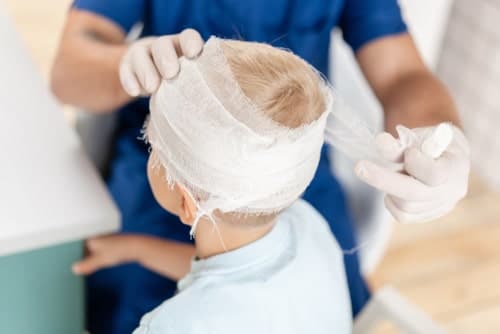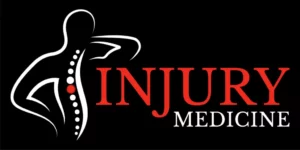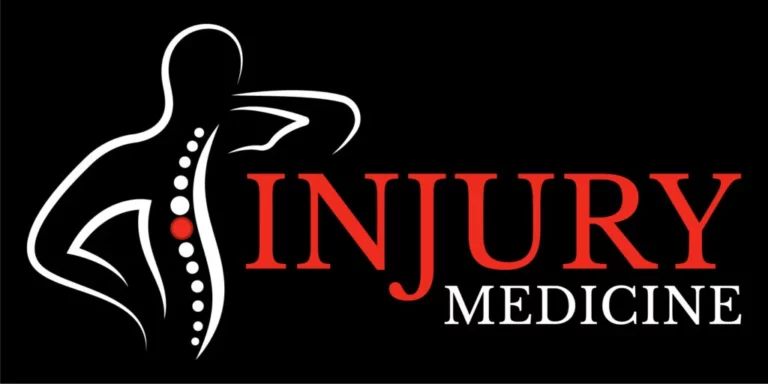If you or a loved one has experienced a brain injury, stroke, lack of oxygen, aneurysm, concussion, or any other type of head injury, you are not alone.
More than 600,000 men, women, and children are currently dealing with some form of traumatic brain injury (TBI) that has been caused by some violent external force – including car crashes, school sports accidents, or slip-and-fall accidents. Injury Medicine in Greenville, SC is your trusted partner ready to help you overcome your life-threatening condition.
Our expert team of healthcare providers offers a wide range of treatments for head injuries in Greenville, SC and we can assure you that you will receive the best care with a treatment plan tailored to you.
Schedule an appointment by calling our injury doctors in Greenville, SC at 864-866-PAIN to assess and treat your condition.
Types of Head Injuries
Head injuries are some of the most common causes of disability and death in adults. A head injury can be mild as a cut on the head or moderate to severe as a deep cut, open wound, or damage to the brain.
Depending on the extent of the head trauma, head injuries are commonly known as brain injury or traumatic brain injury (TBI). Here are different types of head injuries:
Headaches
Headaches are the simplest form of head injury. The main symptom of a headache is pain in the head or forehead area. This pain can be constant, sharp or dull, or throbbing. Headaches are usually treated with medications and stress management techniques.
Skull Fractures
A break in the skull bone is a skull fracture. There are four types of skull fractures including linear skull fractures, basilar skull fractures, depressed skull fractures, and diastatic skull fractures.
Traumatic Brain Injuries
A traumatic brain injury is an injury that impacts how the brain works. They are a major cause of disability and death in the U.S. A TBI occurs when a sudden, external, physical assault damages the brain.
What Is a Traumatic Brain Injury?
A traumatic brain injury happens when a sudden external physical assault damages the brain of an individual. TBI is a broad term that describes an array of injuries that happen to the brain.
The damage can occur in one area of the brain (focal) or diffuse (more than one area of the brain). The severity of TBI can range from a mild concussion to a severe injury that results in coma or even death.
Facts About Traumatic Brain Injuries
The CDC offers the following facts about traumatic brain injuries.
- TBI is a major cause of disability and death in the United States.
- TBIs contribute to more than 30% of all injury deaths in the country.
- More than 153 people die each day in the U.S. as a result of injuries including TBIs.
- The effects of a TBI can last for several days or the rest of the life of the patient.
- Effects of TBI’s include impaired thinking, memory issues, depression, personality changes, and more.
Common Causes of TBIs
There can be numerous causes of TBIs. Here are some of the most common causes of TBIs:
- Auto Accidents – TBIs can occur due to collisions involving cars, buses, motorcycles, or bicycles — and affect pedestrians involved in such accidents.
- Slip & Fall Accidents – Slip and fall accidents in the workplace or at home can result in TBIs. Falls from a ladder, bed, stairs, or in the bath are common causes of a TBI. These types of falls are more common in small children and older adults.
- Workplace Injuries – More than 50% of work-related TBI deaths are among employees in the construction, farming, fishing, transportation, and forestry industries.
Treatment for Traumatic Brain Injury
Traumatic brain injuries are mostly emergencies. The consequences of TBI can quickly worsen without the right treatment. A qualified healthcare provider should assess your condition quickly and begin appropriate treatments.
Here are some of the most common treatments for traumatic brain injury:
Mild TBI
A mild traumatic brain injury may not require treatment other than complete rest and over-the-counter painkillers. But the patient should be closely monitored at home for worsening symptoms. On the other hand, the patient may require follow-up doctor appointments.
Emergency Care
Emergency care is important for moderate to severe traumatic brain injuries. It helps make sure the patient has enough oxygen and adequate blood supply. The blood pressure should be regularly monitored. Hospitalization will also help minimize secondary damage due to inflammation, bleeding, or reduced oxygen supply to the brain.
Medications
- Anti-Seizure Medications – Patients with moderate to severe traumatic brain injuries are at a higher risk of experiencing seizures during the first week after their injury. Anti-seizure medications help prevent any additional brain damage during the first week of the injury.
- Diuretics – Diuretics will reduce the amount of fluid in tissues while increasing urine output. Diuretics are given intravenously to patients with TBIs.
- Coma-Inducing Medications – Your healthcare provider will sometimes give a coma-inducing drug to put you into temporary comas since a comatose brain needs less oxygen to function.
Surgery
Immediate surgery will minimize additional damage to the brain. Surgery is required to deal with the following issues:
- Removing Hematomas – Bleeding within the brain may result in a hematoma or the collection of clotted blood. It puts more pressure on the brain.
- Skull Fractures – Surgery is important to repair skull fractures.
- Bleeding – Head injuries can result in bleeding in the brain. Surgery is required to stop it.
- Opening the Skull – Surgery is needed to relieve pressure from the skull by draining accumulated cerebrospinal fluid.
Rehabilitation
Patients who have experienced moderate to severe TBIs may require rehabilitation. They may need to relearn basic skills including talking and walking. Rehabilitation helps improve their abilities to perform daily activities.
Symptoms of a TBI
The following are common signs of a traumatic brain injury:
- Headaches
- Nausea
- Vomiting
- Drowsiness
- Fatigue
- Sensory issues
- Sensitivity to light and sound
- Mood swings
- Sleep issues
- Depression and anxiety
Diagnosing Your Head Injury
The diagnosis of a head injury is done with diagnostic tests and physical examinations. During this examination, your healthcare provider or doctor will obtain a complete medical history of the patient and family and asks how the injury occurred. You may need to see a neurologist.
Get the Best Treatment for Head Injuries in Greenville, SC!
When you or a loved one has experienced a brain injury, stroke, lack of oxygen, aneurysm, concussion, or any other type of head injury, you should schedule an appointment by calling Injury Medicine in Greenville, SC at 864-866-PAIN to assess and treat your condition.
Our expert team of healthcare providers offers a wide range of treatments for head injuries in Greenville, SC and we can assure you that you will receive the best care with a treatment plan tailored to you.


